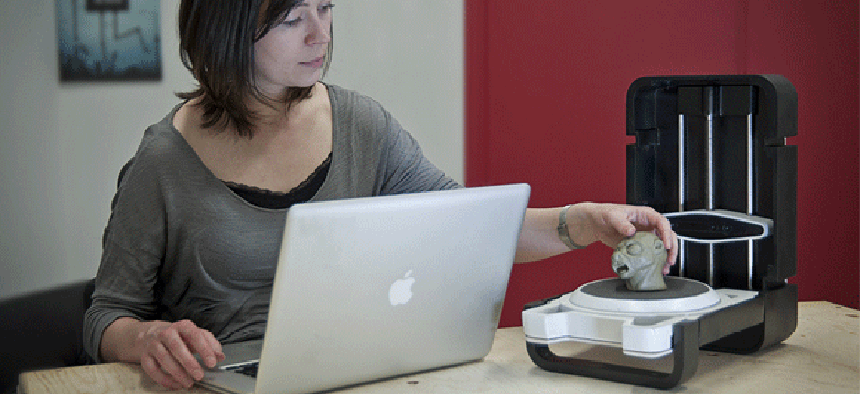Scanner to provide 3D printing's missing link


Connecting state and local government leaders
The Photon scanner uses laser lines and an HD camera to create the CAD files needed for 3D printing.
The prospect of 3D printing, and eventually full-on 3D fabrication, continues to push forward, making inroads in both government and private industry. Recently, the price on some 3D printers has dropped to as low as a couple hundred dollars for a baseline unit.
But even then, there is still a bit of a missing link in the 3D printer world. While 3D printers can fabricate almost anything given to them, they need the schematics or a plan file first.
For a 3D printer, those files have to created using complicated computer-aided design programs, and many CAD suites require intensive training to achieve even marginal proficiency. While many CAD templates exist, the likelihood of finding a template for the exact wrench, handle, gear or tool needed is rather slim. If a specific CAD file doesn't exist, then it's up to the operator to become part engineer and part artist to try and put something together.
A new company called Matterform is trying to change that with the Photon 3D scanner that can take real-world objects and create the detailed CAD files that 3D printers need.
"The Photon 3D scanner allows anyone to take a physical object and turn it into a digital 3D model on your computer,” said Drew Cox of Matterform. The scanner shoots dual laser lines at an object rotating 360 degrees and takes pictures with a high-definition camera, Cox said. Software then creates the digital 3D model. Depending on the object, a scan can be completed in a little as three minutes.
"Once the file is created, it can be modified, reproduced on a 3D printer to create copies of the original object, used in animations or 3D designs or saved to keep a digital archive," he said.
The company's website has pictures of detailed objects that were scanned with the Photon and the resulting CAD files that can be used by any 3D printer. Scans can be made in low or high resolution, depending on how much detail is actually needed for the replication process.
The Photon was successfully crowd-funded, with over $300,000 from donations. The unit itself will go on sale soon for $599.
NEXT STORY: Do video gamers make the best drone pilots?




